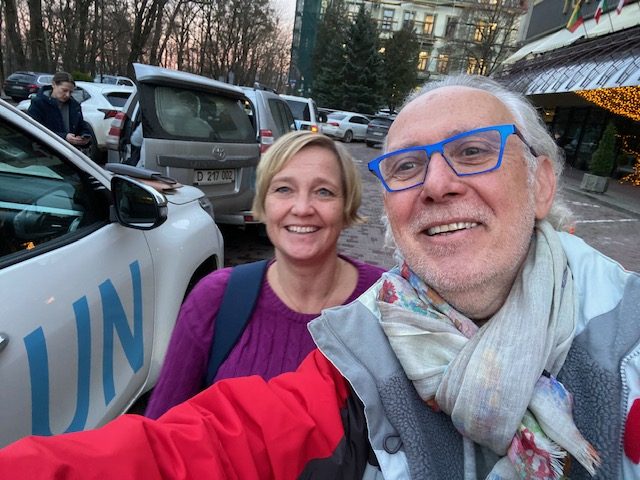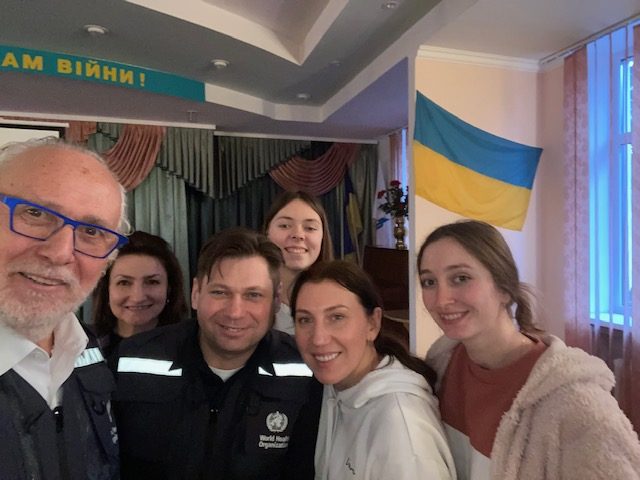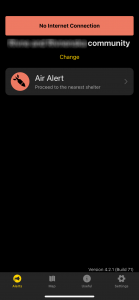by Cheryl Niamath, ICORD

Dr. Andrei Krassioukov keeps thinking about the 29-year old Ukrainian soldier with complete paraplegia who he met last month at Ukraine’s new national spinal cord injury (SCI) rehabilitation centre. Despite being entirely separated from his family—who are living in an area under siege in another part of the country—and with a vastly uncertain future ahead of him, he is dedicated to his rehabilitation. He’s already learned how to use a wheelchair, has started teaching himself wheelchair archery, and is taking time to encourage his peers in their own rehabilitation. Dr. Krassioukov is full of admiration for his resilience.
Dr. Krassioukov—or Dr. K., as he’s known to his patients and colleagues—is a Principal Investigator at ICORD. He holds an endowed research chair, is a professor in the UBC Department of Medicine (Division of Physical Medicine & Rehabilitation), and is an attending physician in the SCI Program at GF Strong Rehabilitation Centre. He just returned to Vancouver after spending three weeks as part of the World Health Organization (WHO) Rehabilitation Team working in the Rivne Oblast province in western Ukraine.
In the Fall of 2022, Dr. K. answered a call for SCI specialists, especially those who speak Ukrainian or Russian, to join a team being assembled by the WHO to help to establish a new Ukrainian national spinal cord injury rehabilitation centre for military personnel injured during the war. Dr. K., an international expert in SCI rehabilitation who also speaks fluent Russian, applied, and was accepted. He joined the interdisciplinary WHO team of three physicians, two occupational therapists, a physiotherapist, a nurse, and a psychologist from Canada, the United Kingdom, Norway, Sweden, Italy, and Australia.
It took three days for Dr. K. to travel from Vancouver to Rivne Oblast via Toronto, Warsaw, Rzeszów, and Lviv, by air, bus, and WHO shuttle. Once there, he worked as a physician in the hospital. He did rounds, met with patients and clinicians, participated in examinations and trained hospital personnel how to conduct neurological evaluations of individuals with SCI according to established guidelines (ISNCSCI). He also provided training sessions on managing bladder & bowel after SCI, as well as the life-threatening cardiovascular disfunction known as autonomic dysreflexia.

While many of his day-to-day experiences were similar to life as a rehab doctor in Canada, some parts were distressingly different—especially treating patients who had experienced horrific multi-trauma battlefield injuries unlike anything he has seen in Canada, with injuries to multiple parts of their bodies in addition to the spinal cord.
One important aspect of rehabilitation medicine in Canada and the US is to work with patients to develop goals for future life in the community: where will they live? What kind of work can they do? What modifications might be needed in their homes? This is challenging in Ukraine.
These are young men who don’t have homes. Their homes are under siege, or have been totally destroyed. This is one of the most challenging and heart-breaking situations I have faced. I can give recommendations for how to manage some physical challenges, but how will they get adjusted to their community? I don’t know. This uncertainty adds a whole extra layer of complication on top of physical rehabilitation,
Dr. Andrei Krassioukov

Almost every hour he would receive an alert on his phone warning of potential incoming bombs, some with orders to seek immediate shelter. He was amazed at the capacity of ordinary Ukrainian people to carry on with life—going to work, taking their children to school, eating at restaurants—while under this constant threat. “It was most unsettling. I learned a lot about bombs,” he said. Luckily, so far, the hospital has been far away from the action.
Dr. K is going back to the hospital in March to continue with the project. He’s planning to work with physicians and hospital administration to help define inclusion and exclusion criteria for admission, as well as translating some important clinical guidelines for management of acute SCI into Ukrainian and providing education on how to appropriately use the guidelines. He will also provide training on assistive technologies, and sexual dysfunctions following SCI.
He is looking forward to returning to Rivne Oblast, despite the multitude of complexities involved, because the work he is doing is important, and deeply appreciated. “Everywhere we went, we were welcomed with warmth,” said Dr. K. “And everyone we met—shuttle drivers, translators, hospital administration and medical staff—was generous with their time.” He is also heartened by the significant support provided to the national rehabilitation hospital by all levels of government in Ukraine.
Currently the hospital is focused on military casualties, but Dr. K. believes that the “perfect combination” of dedicated medical personnel in the hospital, strong support of the local and national administrations, and help from the WHO Rehab Team will lead to the development of a robust national SCI rehabilitation centre in Ukraine to provide care and rehabilitation in the future for any Ukrainian who sustains this devastating injury.
This story originally published in the ICORDian
Photos courtesy of Dr. Krassioukov